Forgiveness
SEARCH BY TITLE
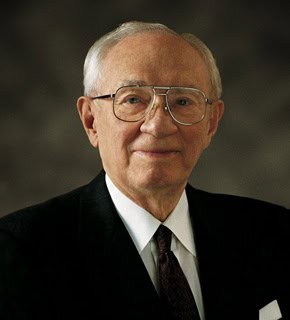 Forgiveness
Forgiveness
I wish today to speak of forgiveness. I think it may be the greatest virtue on earth, and certainly the most needed. There is so much of meanness and abuse, of intolerance and hatred. There is so great a need for repentance and forgiveness. It is the great principle emphasized in all of scripture, both ancient and modern. In all of our sacred scripture, there is no more beautiful story of forgiveness than that of the prodigal son found in the 15th chapter of Luke. Everyone should read and ponder it occasionally. “And when [the prodigal] had spent all, there arose a mighty famine in that land; and he began to be in want. “And he went and joined himself to a citizen of that country; and he sent him into his fields to feed swine. “And he would fain have filled his belly with the husks that the swine did eat: and no man gave unto him. “And when he came to himself, he said, How many hired servants of my father’s have bread enough and to spare, and I perish with hunger! “I will arise and go to my father, and will say unto him, Father, I have sinned against heaven, and before thee, “And am no more worthy to be called thy son: make me as one of thy hired servants. “And he arose, and came to his father. But when he was yet a great way off, his father saw him, and had compassion, and ran, and fell on his neck, and kissed him. “And the son said unto him, Father, I have sinned against heaven, and in thy sight, and am no more worthy to be called thy son”. And the father caused that a great feast should be held, and when his other son complained, he said to him, “It was meet that we should make merry, and be glad: for this thy brother was dead, and is alive again; and was lost, and is found”. When there has been wrongdoing and then there has come repentance, followed by forgiveness, then literally the offender who was lost is found, and he who was dead is made alive. How wonderful are the blessings of mercy and forgiveness. . . The great Atonement was the supreme act of forgiveness. The magnitude of that Atonement is beyond our ability to completely understand. I know only that it happened, and that it was for me and for you. The suffering was so great, the agony so intense, that none of us can comprehend it when the Savior offered Himself as a ransom for the sins of all mankind. It is through Him that we gain forgiveness. It is through Him that there comes the certain promise that all mankind will be granted the blessings of salvation, with resurrection from the dead. It is through Him and His great overarching sacrifice that we are offered the opportunity through obedience of exaltation and eternal life. May God help us to be a little kinder, showing forth greater forbearance, to be more forgiving, more willing to walk the second mile, to reach down and lift up those who may have sinned but have brought forth the fruits of repentance, to lay aside old grudges and nurture them no more.
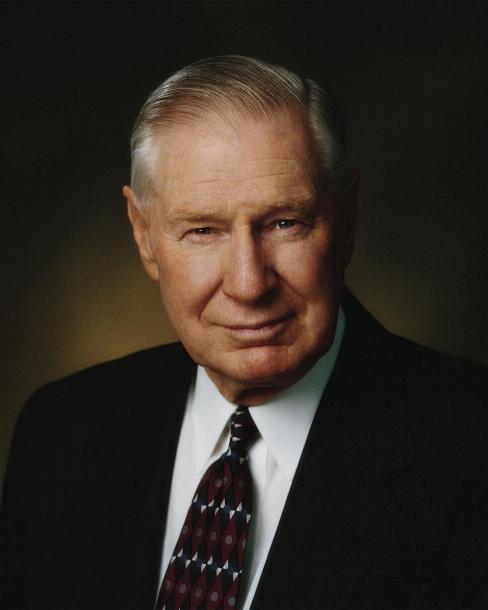 The Healing Power of Forgiveness
The Healing Power of Forgiveness
In the beautiful hills of Pennsylvania, a devout group of Christian people live a simple life without automobiles, electricity, or modern machinery. They work hard and live quiet, peaceful lives separate from the world. Most of their food comes from their own farms. The women sew and knit and weave their clothing, which is modest and plain. They are known as the Amish people. A 32-year old milk truck driver lived with his family in their Nickel Mines community. He was not Amish, but his pickup route took him to many Amish dairy farms, where he became known as the quiet milkman. Last October he suddenly lost all reason and control. In his tormented mind he blamed God for the death of his first child and some unsubstantiated memories. He stormed into the Amish school without any provocation, released the boys and adults, and tied up the 10 girls. He shot the girls, killing five and wounding five. Then he took his own life.This shocking violence caused great anguish among the Amish but no anger. There was hurt but no hate. Their was immediate forgiveness. . . Forgiveness is not always instantaneous as it was with the Amish. When innocent children have been molested or killed, most of us do not think first about forgiveness. Our natural response is anger. We may even feel justified in wanting to “get even” with anyone who inflicts injury on us or our family. Dr. Sidney Simon, a recognized authority on values realization, has provided an excellent definition of forgiveness as it applies to human relationships: “Forgiveness is freeing up and putting to better use the energy once consumed by holding grudges, harboring resentments, and nursing unhealed wounds. It is rediscovering the strengths we always had and relocating our limitless capacity to understand and accept other people and ourselves.” Most of us need time to work through pain and loss. We can find all manner of reasons for postponing forgiveness. One of these reasons is waiting for the wrongdoers to repent before we forgive them. Yet such a delay causes us to forfeit the peace and happiness that could be ours. The folly of rehashing long-past hurts does not bring happiness. Some hold grudges for a lifetime, unaware that courageously forgiving those who have wronged us is wholesome and therapeutic. Forgiveness comes more readily when, like the Amish, we have faith in God and trust in His word. Such faith “enables people to withstand the worst of humanity. It also enables people to look beyond themselves. More importantly, it enables them to forgive.”
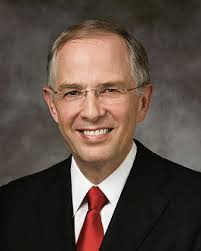 Never Leave Him
Never Leave Him
Offense comes in many costumes and continually finds its way onstage. People we believe in disappoint us. We have unanticipated difficulties. Our life doesn’t turn out exactly the way we were expecting. We make mistakes, feel unworthy, and worry about being forgiven. We wonder about a doctrinal issue. We learn of something spoken from a Church pulpit 150 years ago that bothers us. Our children are treated unfairly. We are ignored or underappreciated. It could be a hundred things, each very real to us at the time. In our weakened moments, the adversary seeks to steal our spiritual promises. If we are not watchful, our injured, childlike spirit will retreat back into the cold, dark crust of our former bloated ego, leaving behind the warm, healing light of the Savior. When Parley P. Pratt, in 1835, was judged unfairly, bringing embarrassment and shame to him and his family, the Prophet Joseph Smith counseled, “Parley, … walk such things under your feet … [and] God Almighty shall be with you.” Another example: In 1830, Frederick G. Williams, a prominent medical doctor, was baptized. He immediately gave of his talents and prosperity to the Church. He became a leader in the Church. He donated property for the Kirtland Temple. In 1837, caught up in difficulties of the times, Frederick G. Williams made serious mistakes. The Lord declared in a revelation that “in consequence of [his] transgressions [his] former standing [in the leadership of the Church had] been taken away from [him].” The beautiful lesson we learn from Frederick G. Williams is that “whatever his personal weaknesses, he had the strength of character to [renew] his loyalty to the [Lord,] the Prophet and … to the Church, when it would have been so easy to have disintegrated in bitterness.” In the spring of 1840, he presented himself at a general conference, humbly asking forgiveness for his past conduct and expressing his determination to do the will of God in the future. His case was presented by Hyrum Smith, and he was freely forgiven. He died a faithful member of the Church. I recently met the president of the Recife Brazil Temple, whose name is Frederick G. Williams. He recounted how his great-great-grandfather’s decision of character had blessed the family and hundreds of his posterity.
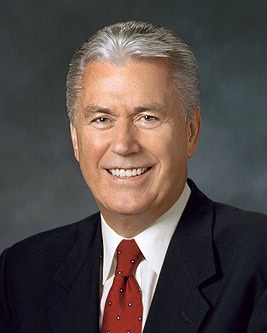 Point Of Safe Return
Point Of Safe Return
We acknowledge that “all have sinned, and come short of the glory of God”, but we also declare with firmness that repentance and forgiveness can be as real as sin. The Atonement of Jesus Christ causes each person to be accountable for his or her individual sins. We will overcome the consequences of individual sin by claiming the blessings and benefits of the Atonement. President David O. McKay said, “Every principle and ordinance of the gospel of Jesus Christ is significant and important … , but there is none more essential to the salvation of the human family than the divine and eternally operative principle [of] repentance”. “For salvation cometh to none … except it be through repentance and faith on the Lord Jesus Christ”. It is not repentance per se that saves man. It is the blood of Jesus Christ that saves us. It is not by our sincere and honest change of behavior alone that we are saved, but “by grace that we are saved, after all we can do”. True repentance, however, is the condition required so that God’s forgiveness can come into our lives. . . Jesus taught us eternal truth when He taught us to pray: “Forgive us our debts, as we forgive our debtors. … For, if ye forgive men their trespasses your heavenly Father will also forgive you; but if ye forgive not … neither will your Father forgive your trespasses”. Therefore, extending forgiveness is a precondition to receiving forgiveness. For our own good, we need the moral courage to forgive and to ask for forgiveness. Never is the soul nobler and more courageous than when we forgive. This includes forgiving ourselves. Each of us is under a divinely spoken obligation to reach out with pardon and mercy and to forgive one another. There is a great need for this Christlike attribute in our families, in our marriages, in our wards and stakes, in our communities, and in our nations. We will receive the joy of forgiveness in our own lives when we are willing to extend that joy freely to others. Lip service is not enough. We need to purge our hearts and minds of feelings and thoughts of bitterness and let the light and the love of Christ enter in. As a result, the Spirit of the Lord will fill our souls with the joy accompanying divine peace of conscience. My dear brothers and sisters, my dear friends, when the captain of a long-range jet passes the point of safe return, and the headwinds are too strong or the cruising altitudes too low, he might be forced to divert to an airport other than his planned destination. This is not so in our journey through life back to our heavenly home. Wherever you find yourselves on this journey through life, whatever trials you may face, there is always a point of safe return; there is always hope. You are the captain of your life, and God has prepared a plan to bring you safely back to Him, to your divine destination. The gift of the Atonement of Jesus Christ provides us at all times and at all places with the blessings of repentance and forgiveness. Because of this gift, the opportunity to make a safe return from the disastrous course of sin is available to all of us.
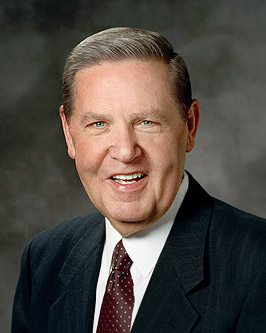 “Remember Lot’s Wife”
“Remember Lot’s Wife”
Perhaps at this beginning of a new year there is no greater requirement for us than to do as the Lord Himself said He does: “Behold, he who has repented of his sins, the same is forgiven, and I, the Lord, remember them no more”. The proviso, of course, is that repentance has to be sincere, but when it is and when honest effort is being made to progress, we are guilty of the greater sin if we keep remembering and recalling and rebashing someone with their earlier mistakes—and that “someone” might be ourselves. We can be so hard on ourselves, often much more so than with others! Now, like the Anti-Nephi-Lehies of the Book of Mormon, bury your weapons of war, and leave them buried. Forgive, and do that which is harder than to forgive: Forget. And when it comes to mind again, forget it again. You can remember just enough to avoid repeating the mistake, but then put the rest of it all on the dung heap Paul spoke of to those Philippians. Dismiss the destructive and keep dismissing it until the beauty of the Atonement of Christ has revealed to you your bright future and the bright future of your family and your friends and your neighbors. God doesn’t care nearly as much about where you have been as He does about where you are and, with His help, where you are willing to go. That is the thing Lot’s wife didn’t get—and neither did Laman and Lemuel and a host of others in the scriptures. This is an important matter to consider at the start of a new year—and every day ought to be the start of a new year and a new life. Such is the wonder of faith and repentance and the miracle of the gospel of Jesus Christ.
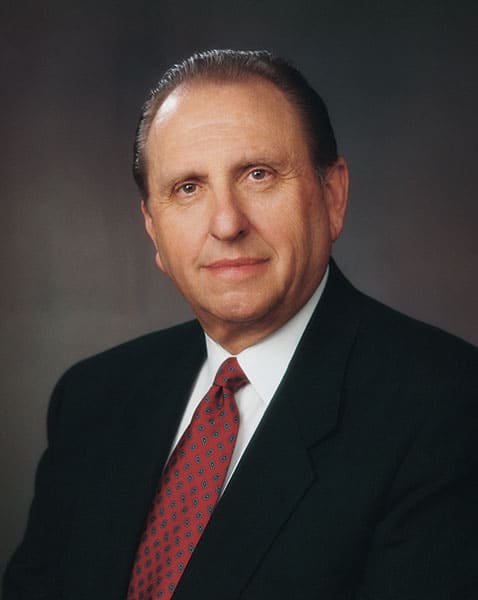 You Make a Difference
You Make a Difference
An inspiring lesson is learned from a “Viewpoint” article which appeared recently in the Church News section of the Deseret News. May I quote: “To some it may seem strange to see ships of many nations loading and unloading cargo along the docks at Portland, Oregon. That city is 100 miles from the ocean. Getting there involves a difficult, often turbulent passage over the bar guarding the Columbia River and a long trip up the Columbia and Willamette Rivers. “But ship captains like to tie up at Portland. They know that as their ships travel the seas, a curious salt water shellfish called a barnacle fastens itself to the hull and stays there for the rest of its life, surrounding itself with a rock-like shell. As more and more barnacles attach themselves, they increase the ship’s drag, slow its progress, decrease its efficiency. “Periodically, the ship must go into dry dock, where with great effort the barnacles are chiseled or scraped off. It’s a difficult, expensive process that ties up the ship for days. But not if the captain can get his ship to Portland. Barnacles can’t live in fresh water. There, in the sweet, fresh waters of the Willamette or Columbia, the barnacles loosen and fall away, and the ship returns to its task lightened and renewed. “Sins are like those barnacles. Hardly anyone goes through life without picking up some. They increase the drag, slow our progress, decrease our efficiency. Unrepented, building up one on another, they can eventually sink us. “In His infinite love and mercy, our Lord has provided a harbor where, through repentance, our barnacles fall away and are forgotten. With our souls lightened and renewed, we can go efficiently about our work and His”
